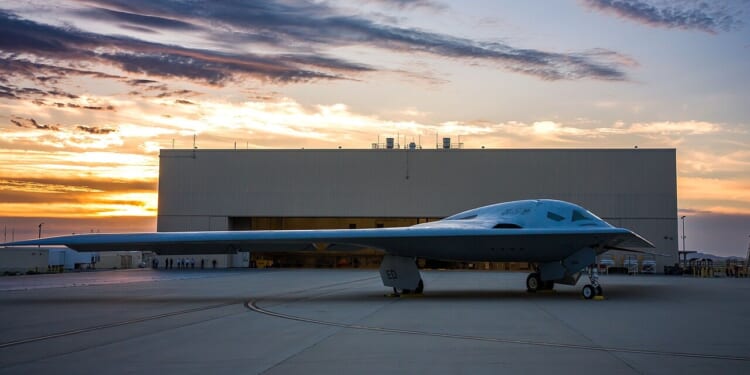Politicians in the United States have drawn attention to the shutdown’s effects on domestic welfare. Critically, however, it is opening gaps in America’s national security as well.
The United States Air Force, in concert with Northrop Grumman, is in talks to accelerate the production rate of the new B-21 Raider nuclear-capable, long-range stealth bomber. But those talks are now on hold as long as the federal government shutdown persists. The shutdown is disrupting ongoing negotiations and resource availability, slowing down the Air Force’s already languid pace toward building a replacement for its aging fleet of B-2 Spirit long-range nuclear-capable stealth bombers.
The B-21 is one of the last remaining tactical and strategic levers the United States has in preserving its long-range strike and deterrent edge in a world where great-power competition is accelerating. The pause induced by a domestic shutdown is, therefore, stymying America’s ability to maintain any edge against its foes.
Of course, the government shutdown might force America’s two political parties to actually sit down and negotiate a better outcome to America’s overall spending crisis—an outcome which would be far better for US national security in the long run. But there is no guarantee of this.
B-21 Production Was Already Well Behind Schedule
There is already a massive delay in the B-21 Raider program simply because of the complexity and cost involved. Another added complication is that the Air Force wants between 100 and 150 airframes. Critically, every second of delay has a compounding effect on stymying American power projection. If the Air Force is targeting between 100-150 B-21s, and Northrop Grumman is already absorbing hundreds of millions of dollars in extra costs to ramp up production—why hold the program up now?
While we dither internally, China and Russia move rapidly to deploy their own stealth systems and other technologies aimed at overriding the advantages that American stealth provides US forces in war. While the shutdown might be good for domestic politics, it is harming readiness—and empowering, however indirectly, Chinese and Russian attempts to catch up to and surpass US stealth capabilities.
A recent essay in Defense One highlights how Northrop is expecting awards for low-rate initial production later this year (lots three and five) and continuing discussions on how to accelerate the production rate. So, this accelerated plan is already going to cost more than the original, small footprint plan, which was already very expensive.
We’re all going to be paying more for the scaling up of the B-21 from a handful of planned planes to possibly 100 or more—though I remain suspicious that we’ll be lucky to get two dozen of these birds in any meaningful timeline.
America’s Enemies Are Happy with the Shutdown
Why make the American people pay even more due to delays imposed by a domestic political squabble?
We hear often about how America’s enemies are exploiting the political differences between the two political parties here at home in order to create strategic opportunities. What is left unsaid, however, is how domestic political fights are hamstringing America’s ability to produce the weapons and platforms needed to deter adversaries. And it is happening without any interference from foreign actors.
Everywhere one turns, one sees signs of American decline. The indefinite pause of the B-21’s production line is not just a production hiccup. It is a crack in America’s ability to deter its rivals and defend itself from advancing threats. The world now knows that American defense posture is inextricably tied to the ravages and peculiarities of the US national defense budget.
About the Author: Brandon J. Weichert
Brandon J. Weichert is a senior national security editor at The National Interest. Recently, Weichert became the host of The National Security Hour on America Outloud News and iHeartRadio, where he discusses national security policy every Wednesday at 8pm Eastern. He is also a contributor at Popular Mechanics and has consulted regularly with various government institutions and private organizations on geopolitical issues. Weichert’s writings have appeared in multiple publications, including The Washington Times, National Review, The American Spectator, MSN, The Asia Times, and others. His books include Winning Space: How America Remains a Superpower, Biohacked: China’s Race to Control Life, and The Shadow War: Iran’s Quest for Supremacy. His newest book, A Disaster of Our Own Making: How the West Lost Ukraine is available for purchase wherever books are sold. He can be followed via Twitter @WeTheBrandon.
Image: Wikimedia Commons.

















